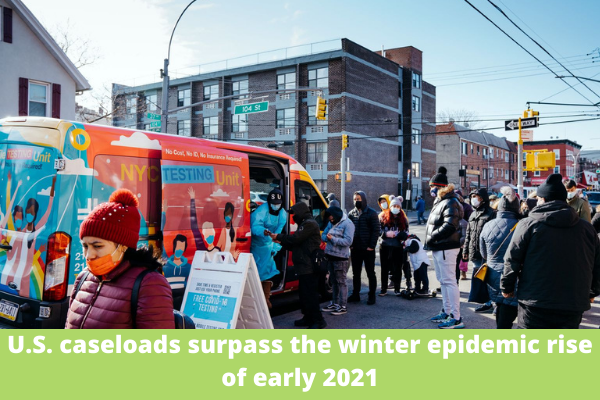The highly transmissible omicron variety is causing daily caseloads in certain regions of the United States to climb to levels greater than those seen during the pandemic’s apex in the previous winter.
According to statistics, Delaware, Hawaii, Massachusetts, New Jersey, New York, and Puerto Rico are among the states that have reported more coronavirus infections in the previous week than in any other seven-day period in the prior year.
The data show how quickly omicron spreads throughout the nation, despite certain research from other countries indicating that the variety may cause less severe sickness.
Experts worry that the jump in illnesses, along with the fact that tens of millions of Americans are still unvaccinated, will continue to place a significant burden on the United States’ healthcare system and result in a significant increase in the number of fatalities.
Before holiday festivities disrupted data reporting earlier this week, the seven-day national average of new daily cases topped 197,000, representing a 65 percent increase over the previous 14 days.
According to a database maintained by the New York Times, fatalities climbed by 3 percent over that period, reaching a seven-day average of 1,345.
The national record for the average daily cases is 251,232, established in January following a post-holiday spike in the number of cases.
Hospitalizations are also rising, albeit not at the same rate as cases. COVID-19 has been linked to about 71,000 hospitalizations in the United States this week, increasing 8 percent from the previous week but still significantly below prior peaks.
In New York City, there has been a fourfold rise in the number of COVID hospital admissions among children after December 5. In an alert by the New York State Department of Health, it was reported that the new variety is spreading swiftly.
Approximately half were under the age of five and hence ineligible for immunization. Following the declaration of a state of emergency by New York Gov. Kathy Hochul earlier this month, elective procedures were halted at several hospitals.
Last week, Gov. Charlie Baker of Massachusetts said that he would mobilize up to 500 troops of the National Guard to assist overwhelmed hospitals in the state. A large number of other states have followed suit.
According to government statistics, vaccination remains a very effective preventative measure against serious disease.
A study conducted by the Centers for Disease Control and Prevention found that unvaccinated persons are five times more likely to test positive for COVID and fourteen times more likely to die from the disease than those vaccinated.
Must read: US troops will get pay amount in 2022 when factoring in inflation
Despite this, just 62 percent of Americans have received a complete vaccination. The nation’s medical infrastructure is in dangerous condition two years after the outbreak began, as hospitals deal with staff shortages exacerbated by burnout and early retirements.
Dr. Anthony Fauci, the nation’s foremost infectious-disease specialist, warned on ABC’s “This Week” on Sunday that “when you have such a huge number of new infections, it can overcome a genuine reduction in severity.”
According to data from South Africa and certain European nations, omicron infections are milder and result in fewer hospitalizations than other types of infections.
However, experts caution that this may not be the case everywhere and that the increase in cases may continue to overwhelm hospitals in many nations.
During an interview, Akiko Iwasaki, an immunologist and researcher at the Yale School of Medicine, said that each location has its demographics, healthcare system access, and vaccination distribution.
She went on to say that individuals in England, Scotland, and South Africa may have developed sufficient protection from other illnesses to cope with this variety or that there may be fundamental changes in the pathogenicity of omicron that result in fewer people being admitted to hospitals.
Must check: How To Increase Your Social Security Benefit With SSI
“We can’t presume that the same things will happen in the United States,” Iwasaki said of Japan. “That is not an excuse for us to relax our procedures here, and we must continue to vaccinate those pockets of individuals who are still unvaccinated,” says the doctor.
Stay tuned with us for more info and news!

